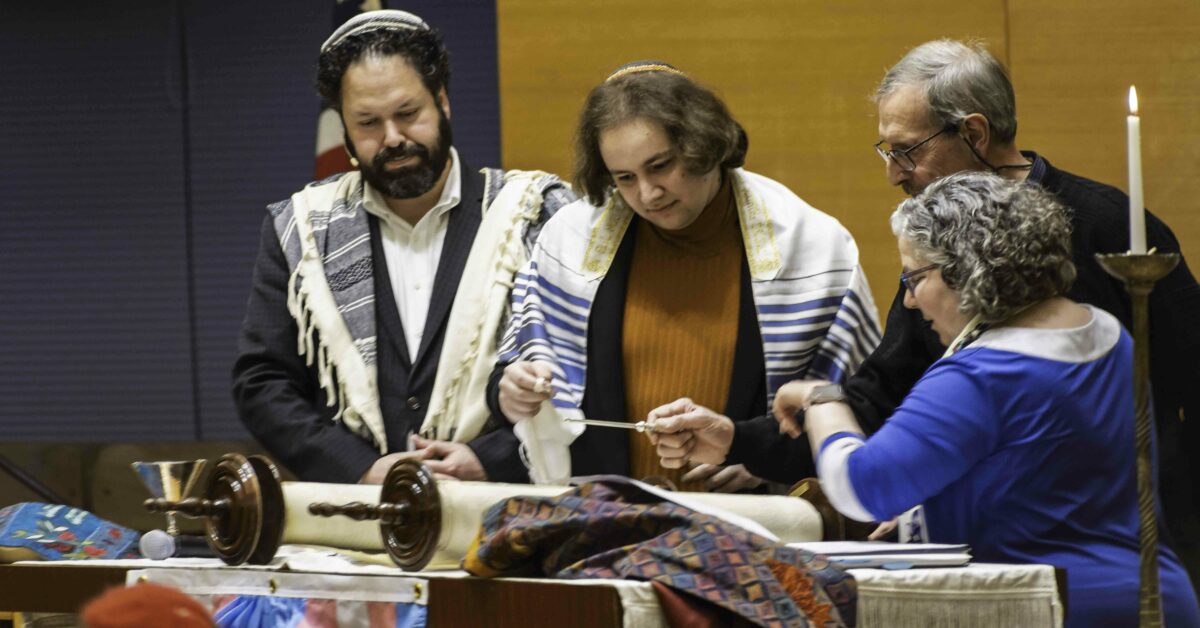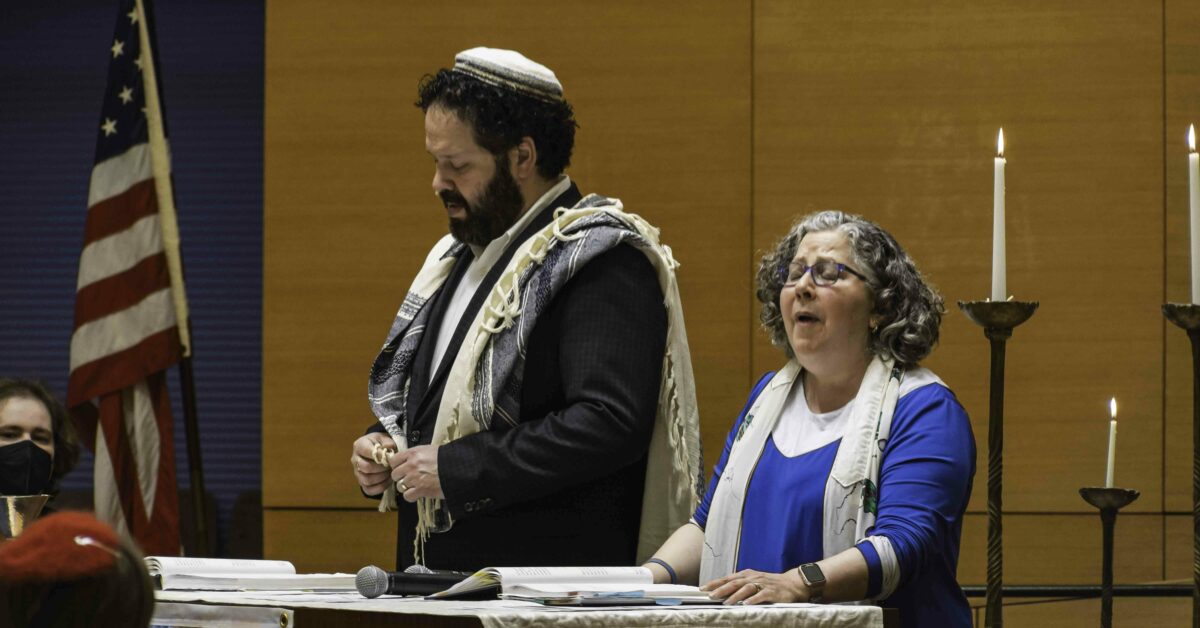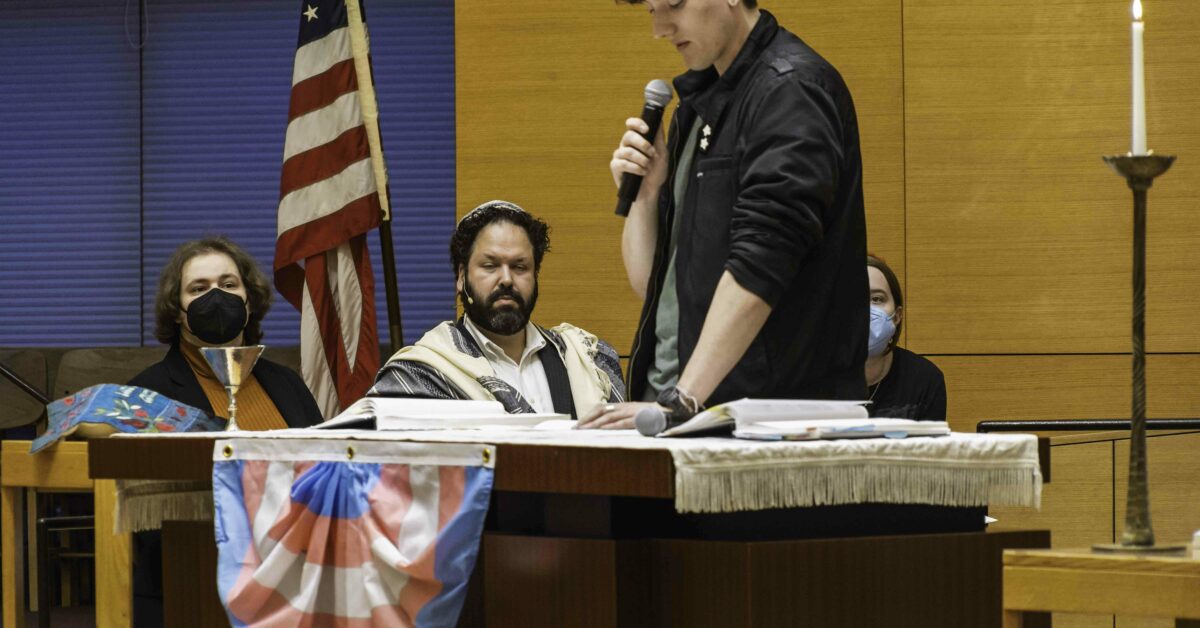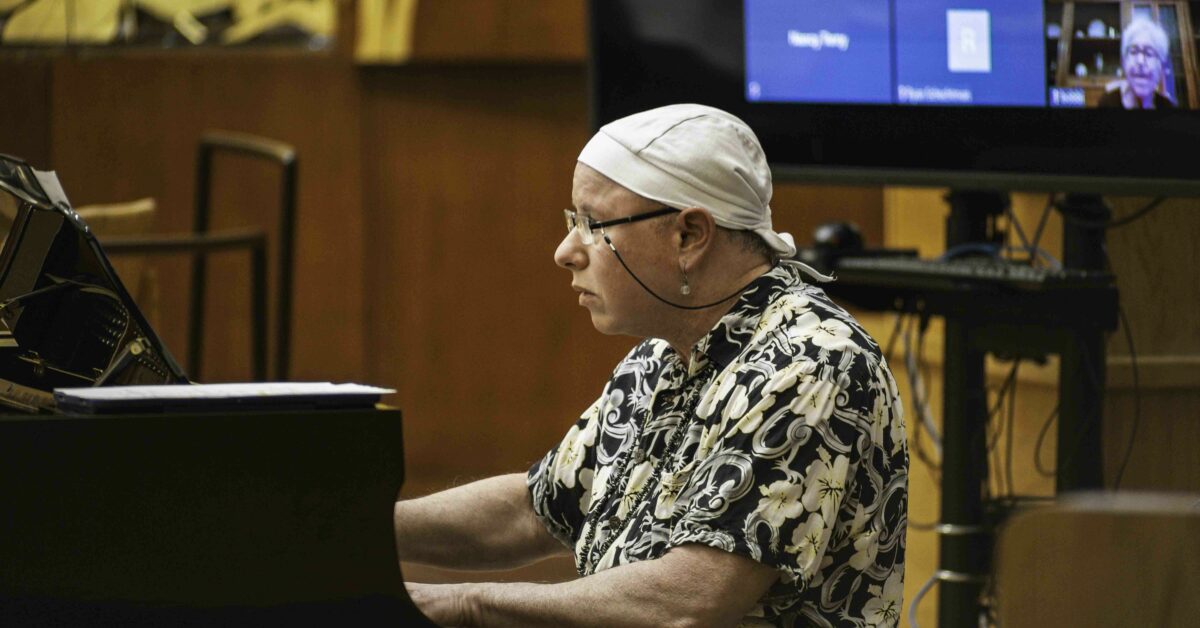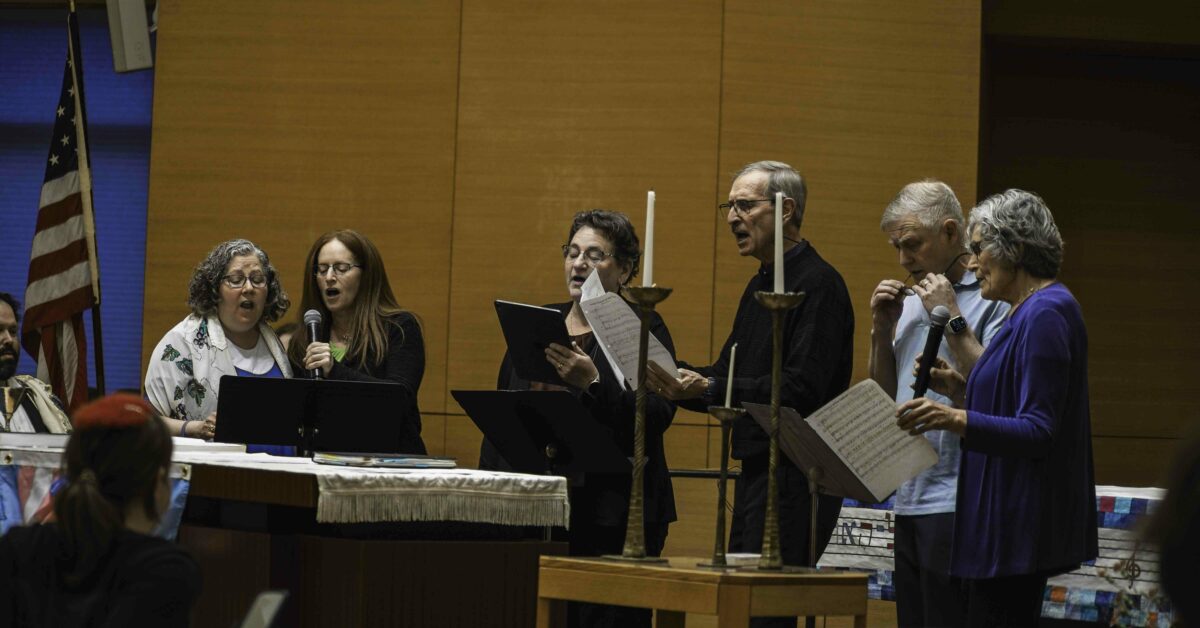Why So Many Local Queer Folks Are Flocking to Mishpacha, Temple Beth Emeth’s Thriving LGBTQ+ Affinity Group
Mishpacha founder Ari Smith and religious educator Ari Marcotte dish on what makes this space so special for queer Jews

Ari Smith was a little worried when her rabbi called to ask her about something he was noticing in her part of the sanctuary during weekly services at Temple Beth Emeth, a Reform Jewish synagogue in Ann Arbor. “I was thinking ‘No! He’s noticed I’m talking or something during his sermon,’” she recalls, laughing about the interaction almost two years ago.
“Actually, he had noticed that a lot of young queer people were kind of grouping up together,” she continues, “and he wondered if there was anything we needed. What would make this better for us? How could [Beth Emeth] be more welcoming?”
It only took a little encouragement from Rabbi Josh Whinston before Smith, a lesbian, along with Beth Emeth members like non-binary trans religious education leader Ari Marcotte, who uses they/them pronouns, were off and running with plans to engage the temple’s queer congregants. Smith soon founded Mishpacha, a thriving LGBTQ+ affinity group that offers an active calendar of events for local queer Jewish and Jewish-curious community members. The group celebrated its one-year anniversary in February.
Smith says some Mishpacha participants attend Beth Emeth as congregants and follow the religious tenets of Judaism, while others exclusively seek the familiarity and community spirit inherent in cultural Jewish rituals like monthly Shabbat dinners. “For some folks, it’s really hard to be like, ‘I’m not a religious person,’ but they still have a connection to Judaism in a more secular way. Having a Jewish space where they don’t have to pick between one or the other, but they get to have a Friday night dinner with candles and things like that feels really welcoming to them.”
Once word got out about Mishpacha, “people just started showing up,” Marcotte says. “It’s a space where you can be queer and Jewish without having to prioritize one over the other in terms of how you interact with people.” The group’s popular Shabbat dinners are held on the third Friday of each month at 6 p.m. at Temple Beth Emeth.
In March, the temple held a Shabbat service commemorating the annual International Trans Day of Visibility, an event Smith says was created to “highlight the beauty in being trans, the joy that comes from it, and how there is and always has been enough room in Judaism for us all.” The prayers spoken during the service focused on trans and queer experiences and attendees read poetry and san songs written by members of the community. Aside from Temple Beth Emeth clergy, every speaker was a member of the trans community.
Marcotte tells Pride Source that creating Mishpacha wouldn’t have been possible without support from Rabbi Whinston and the temple, but that community interest and support has been key, as well. “There’s a clear desire for this,” they say. “This isn’t something where we’re building the space and nobody’s coming — people are turning out who haven’t been to a synagogue in years.” On the other end of the spectrum are young adults who are brand new to the Jewish faith — especially those representing Gen Z, a demographic that seems increasingly drawn to Judaism in recent years. Marcotte and Smith both note that young adult membership tends to skew queer at Beth Emeth.
“I have my theories, though I’m not a hundred percent certain, about what phenomenon is drawing all of these young, queer people to Judaism,” Marcotte says. “But I love it. I love meeting other queer Jews, and when Ari approached me, I had so many ideas for ways I want to build community here.”
Not long ago, Smith herself was a newcomer at Temple Beth Emeth — and to Judaism altogether. She says the religion had always interested her, especially as a college student, but she kept running into barriers, like a non-supportive partner and doubts about whether she would be fully accepted into the community. After her marriage ended in divorce and her dad was diagnosed with a serious illness, she says, “I knew I really needed community and that it was the right time for me. I jumped in with both feet and I got really lucky.”
One lucky aspect of Smith’s decision to convert to Judaism that didn’t appear particularly lucky at first was that the timing coincided with Covid lockdown. But Smith made it work, meeting with Rabbi Whinston once a month over Zoom and directing much of her own studies, which focused mostly on women and queer people in Judaism. As a smaller faith community, Smith says, Beth Emeth conversion students often approach their Judaic studies in a self-directed way.
Smith was drawn to the Reform denomination of Judaism as opposed to Conservative or Orthodox in part because of the way queer people have been welcomed into the fold. “Reform was one of the first to welcome queer people into the Jewish community,” she explains. “It was one of the first to allow gay marriages before it was legal — other branches are really expanding their acceptance now, conservative in particular — but Reform felt the most welcoming while still being religiously sound for me.”
Marcotte says Beth Emeth and the liberal Reform movement has had a long commitment to social justice, anti-racism efforts and giving voice to those who don’t typically have a voice. “There’s a strong commitment to uplifting the queer community and doing things like ordaining queer rabbis — it’s not exclusive to Reform Judaism but they’ve been the pioneers. That’s part of why our rabbi came to us and said, ‘I’ve noticed a lot of dyed hair and pronouns in this corner of the sanctuary. How can we make you feel as included as possible?’”
Marcotte saw a path toward more inclusion through a weekly queer Torah study group. “Judaism already encourages a kind of grappling and struggling with text and history,” Marcotte explains, “and so doing that from an explicitly queer perspective is a logical next step.” Alongside Smith, Marcotte leads Mishpacha’s hybrid in-person and online Torah study groups each Tuesday at 7 p.m.
Around 33% of American Jews identify as Reform, while around 15% practice Conservative Judaism and 8% follow Orthodox Judaism, according to a 2017 Pew Research study. Meanwhile, 29% of American Jews do not adhere to a particular denomination.
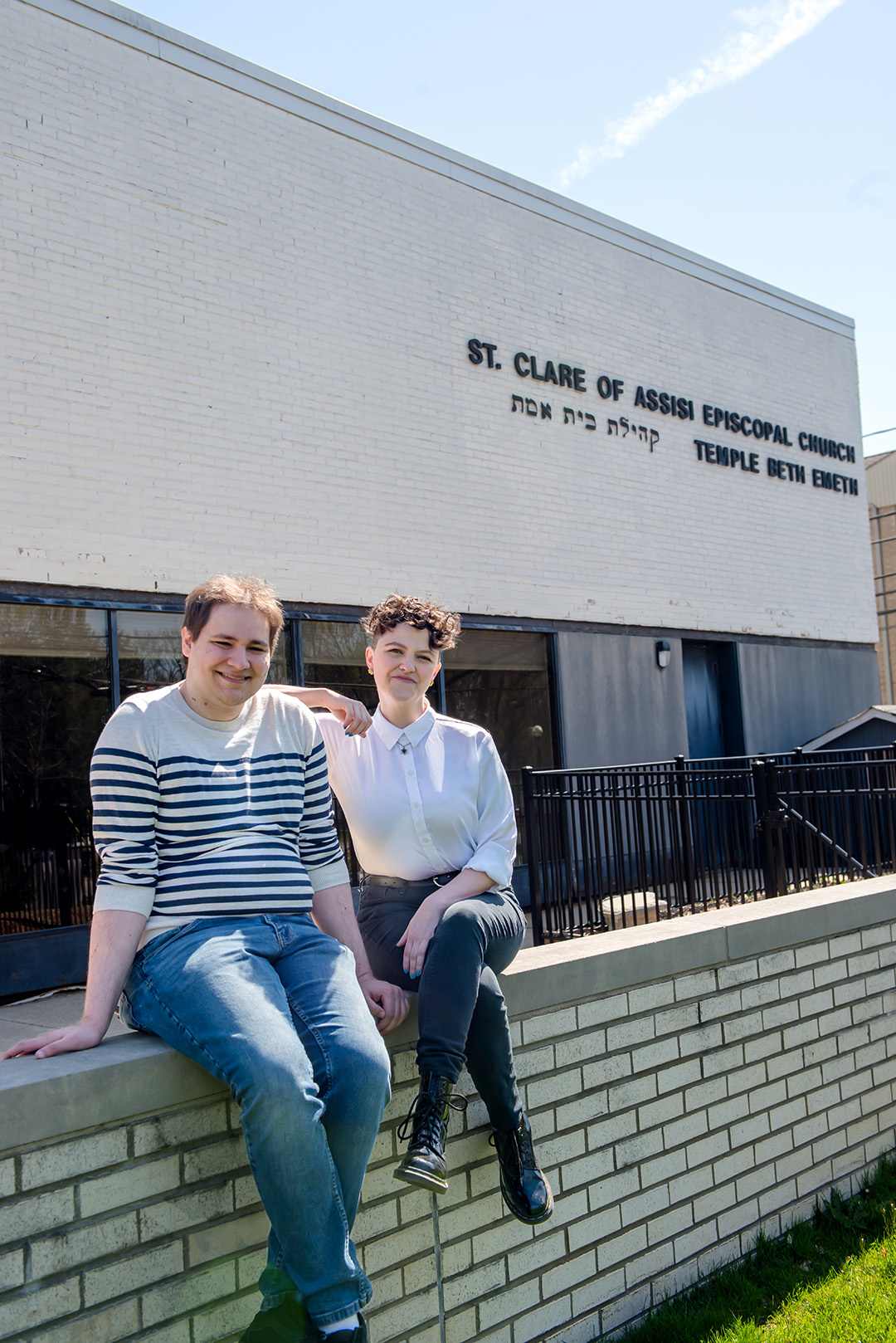
Because the concept of community is so central to Judaism, Marcotte isn’t surprised to see young, queer people exploring conversion, “people who need spiritual nourishment from a religious community but who say ‘Christianity left me with a real bad taste in my mouth and I’m seeking to challenge some of the things we take for granted in the secular world because of that cultural Christian narrative.” Still, Marcotte cautions, it’s not an easy process, especially compared with the typical conversion practices of many Christian sects. “You don’t just walk up and say you want to be baptized,” Marcotte says. “There’s a tradition that the rabbi turns you away three times before you begin classes, and it could take years before you actually finally undergo the final process. There’s a lot of studying and writing involved, too, but it’s a very rewarding and fulfilling process.”
For the curious, Marcotte suggests reaching out to Jewish people in your friend circle and people you know in the local community to ask questions and to explore resources like a temple’s website. The Temple Beth Emeth (templebethemeth.org) site offers a “become a member” page and other resources geared toward people new to the faith. And, of course, there are Mishpacha events, where there’s a mix of people in various stages of conversion — or who have opted not to convert yet. “We’ve had people come who are interested in converting to Judaism, stay for a couple of months and then say they don’t think they are ready — and that’s fine,” Marcotte says. “There’s no sense that once you dip your toe in the water, you have to go all the way in. Curiosity is never a bad thing.”

